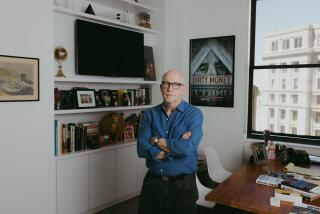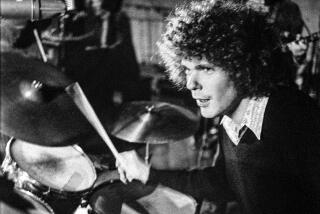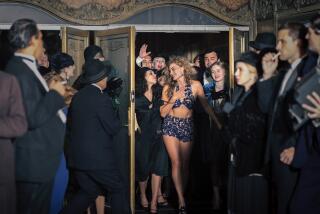Saxophonist, Oscar Nominee Dexter Gordon Dies at 67
- Share via
Dexter Gordon, the free-spirited saxophone improvisationist whose melancholy demeanor and laconic wit permeated one of the most praised jazz films of all time, died Wednesday.
Gordon, nominated for a best actor Academy Award for his raspy-voiced portrayal of the drug- and booze-weary cynical jazz artist in the film “Round Midnight,” was 67.
A spokesman for Thomas Jefferson University Hospital in Philadelphia said Gordon died of kidney failure. He also was being treated for cancer of the larynx.
Although a force in modern music for four decades, Gordon had not played his tenor saxophone in public for four years before emerging on the world stage after the 1986 film, which featured a cast of black American musicians who had fled bigotry in America for the more tolerant racial climate of Europe.
At 6 feet, 5 inches, Gordon was a dominating figure on and off stage. In person he was as soft-spoken as his film persona, Dale Turner, and suffered many of the health problems that also plagued that fictional character, which he described as a composite of several musician friends.
Gordon had battled a drug and alcohol problem in his younger years but by 1960 claimed that he had conquered both.
His brushes with the law kept him from acquiring a nightclub work permit and he went to Europe. A 1962 performance in London that showcased his laid-back, behind-the-beat phrasing proved so successful that he stayed in Europe for the next several years, making an occasional trip to Japan.
He returned to New York in 1975 and, in 1980, was elected to the Jazz Hall of Fame. Readers of Down Beat magazine named him “musician of the year” in 1978 and 1980.
But by 1987, Los Angeles Times jazz critic Leonard Feather said after reviewing a Hollywood Bowl appearance that Gordon “was a once formidable talent no longer in command of the values that established him as the foremost tenor saxophonist of the be-bop era.”
“Round Midnight” was not Gordon’s first film. While in jail in Chino in the mid-1950s on a narcotics charge, he portrayed a musician in a low-budget prison picture. In 1960 he appeared in the Los Angeles production of “The Connection,” a play about addicts.
Just before his most recent illness, Gordon had finished another film, “Awakenings,” with Robert De Niro and Robin Williams.
First a clarinetist and then a saxophonist while in his early teens in his native Los Angeles, Gordon fell under the sophisticated influence of Lester Young but later mastered the extroverted vibrancy of Illinois Jacquet and the complex harmonics of Charlie Parker.
One of his most famous periods was a 1947-52 tour with fellow tenor saxophonist Wardell Gray, billed as a “Battle of the Saxes.”
He was the son of a Los Angeles physician whose patients included Duke Ellington and Lionel Hampton, whose band the young Gordon joined in 1940 when he was only 17. He appeared in his 20s with the Louis Armstrong and Billy Eckstine bands and then joined Parker in New York.
But in the 1950s his career slowed with the decline of be-bop and it was not until he began a series of albums on the Blue Note label, coupled with his European successes, that he again became popular.
“Round Midnight,” titled for the Theolonius Monk signature composition, came as a surprise to Gordon, who became the only musician ever nominated for an Oscar.
“Suddenly one day (co-writer-director Bertrand) Tavernier came to my apartment in New York,” Gordon said in a 1987 interview with Feather. “He’d seen me working in a Paris club when I was a young man and he had this idea for a movie about jazz. . . . I had trouble believing that he was serious . . . but I somehow believed in him. . . .”
After the acclaim that greeted the film and its Oscar-winning score--juxtaposed with the critical cry that it took a Frenchman to define the angst of American jazz musicians--Gordon became an overnight celebrity.
He accepted his new-found fame with the ready smile that had marked his life.
He found it amazing, he said amid all the Oscar hullabaloo, that--despite his dissipative lifestyle--”I’m still alive.”
Survivors include his wife, Maxine, and five children. Services are pending in New York.
More to Read
Only good movies
Get the Indie Focus newsletter, Mark Olsen's weekly guide to the world of cinema.
You may occasionally receive promotional content from the Los Angeles Times.










